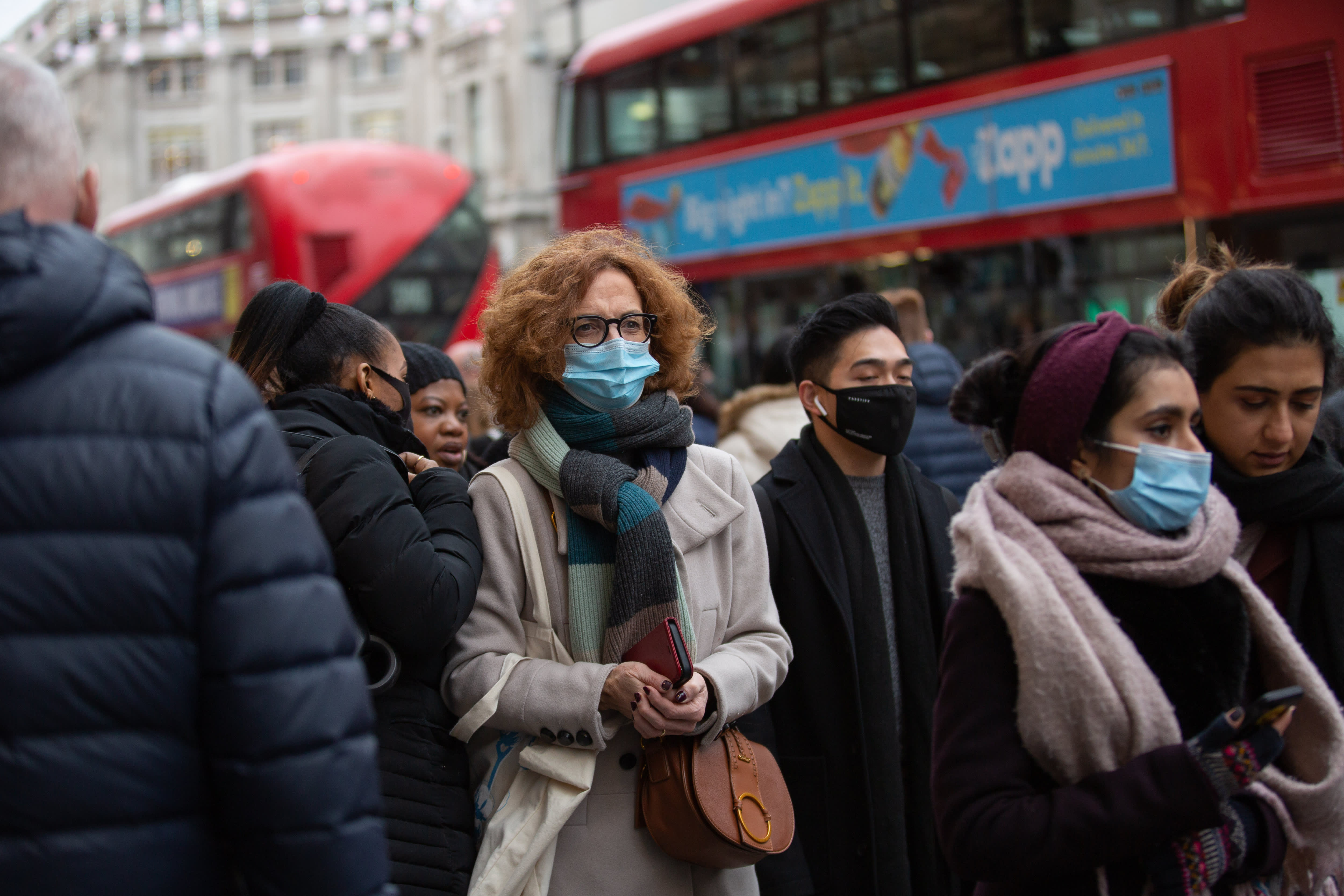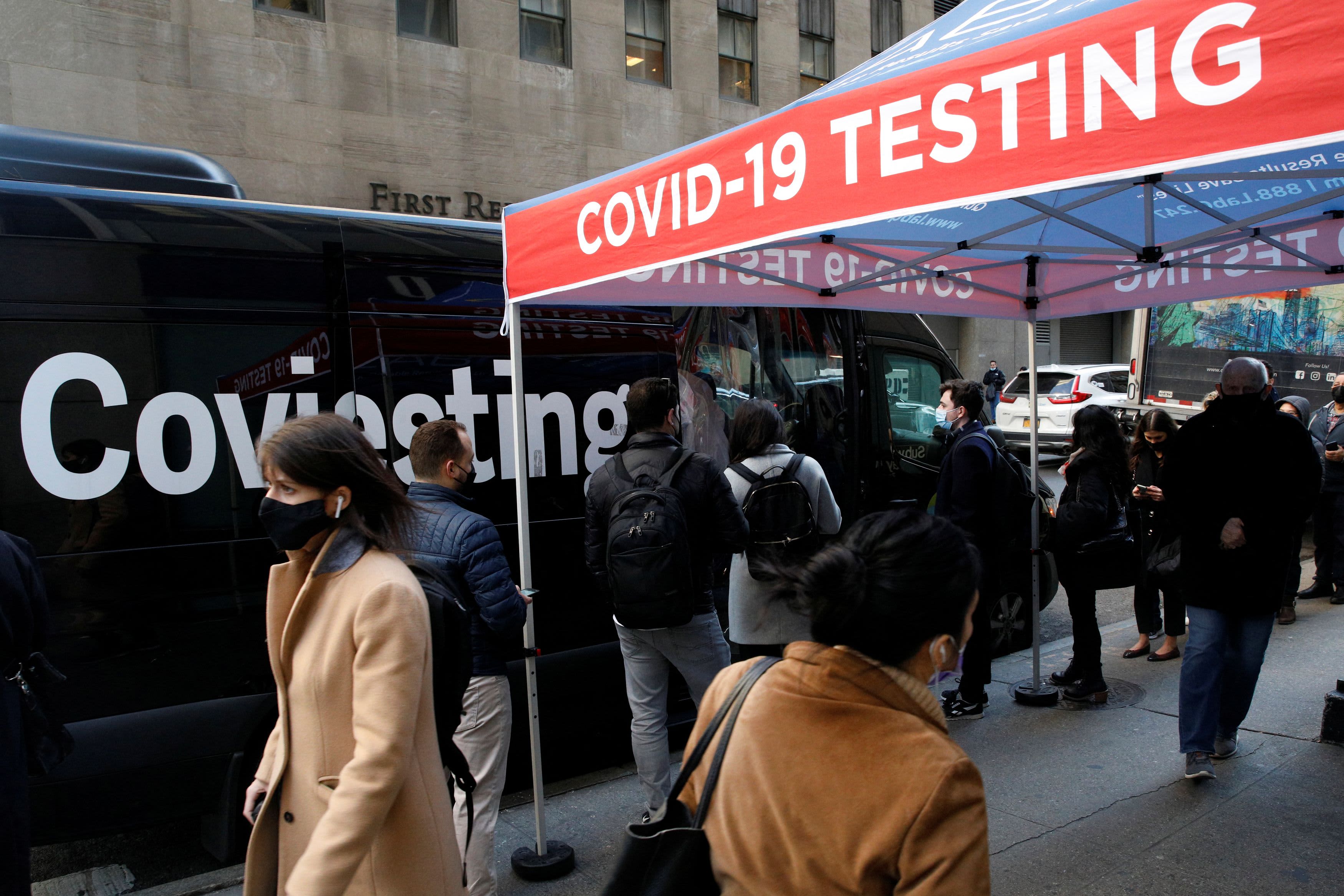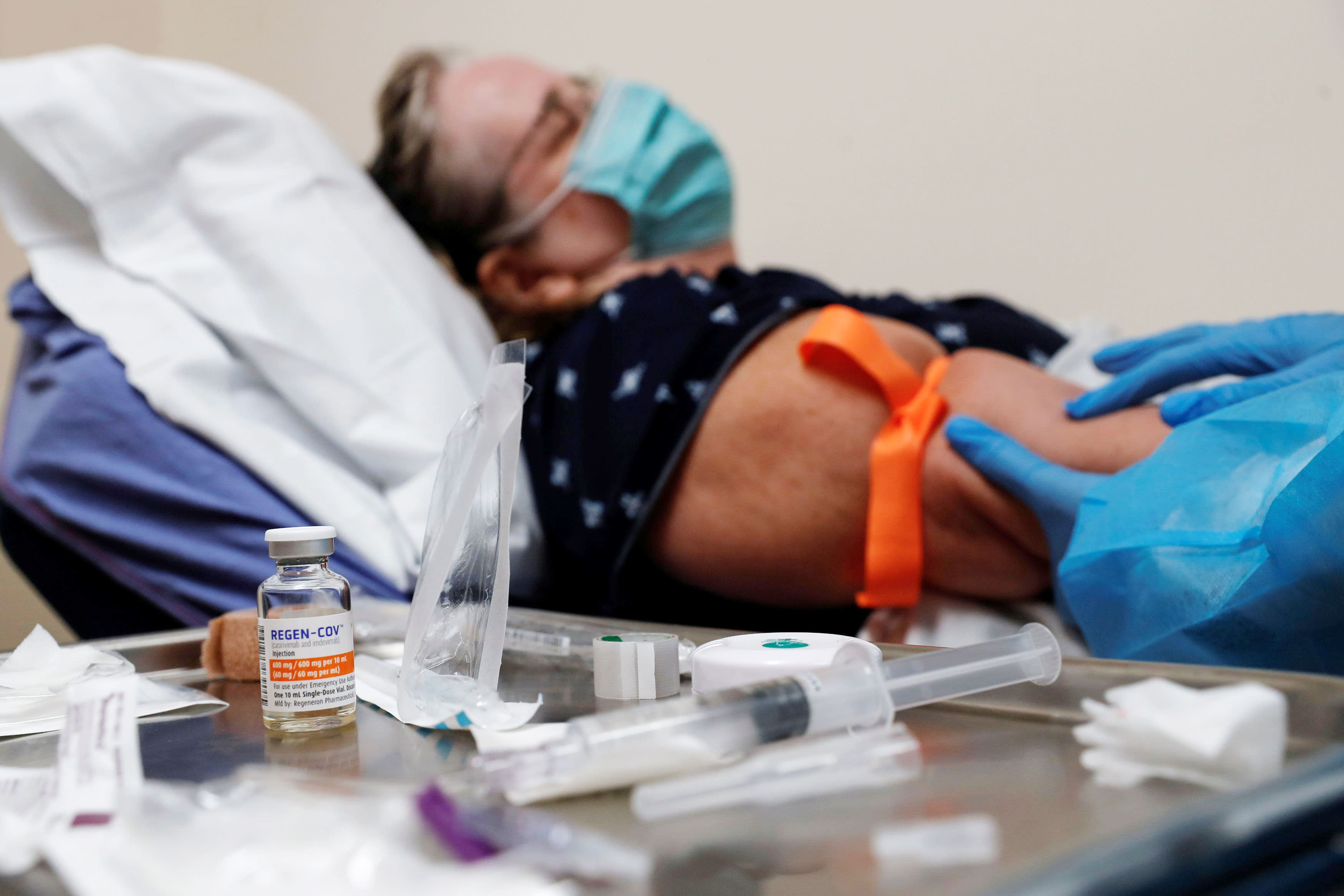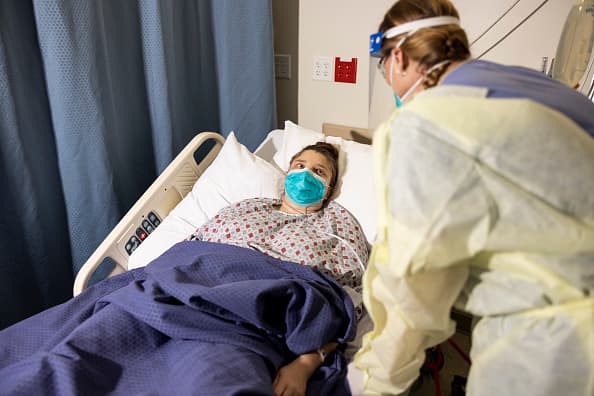The omicron variant of COVID-19 continues to appear across the country, including right here in New England.
Through Wednesday, only one case had been officially reported in Massachusetts by the state Department of Public Health. However, the city of Boston reported three cases of omicron on Wednesday, and the Boston Globe is reporting that as many as 15 cases have already been detected in the Bay State.
It begs the question: just how prevalent is the latest variant of concern in Massachusetts with Christmas less than 10 days away?
Here's a breakdown of what we know about the omicron variant and its presence here in Massachusetts:
Get New England news, weather forecasts and entertainment stories to your inbox. Sign up for NECN newsletters.
Where have omicron cases been reported so far in Massachusetts?
Only one case had been officially reported in Massachusetts as of Wednesday, but the city of Boston reported three cases of omicron in its data from Wednesday, while the Boston Globe is reporting that as many as 15 cases have already been detected here.
Source: CoVariants
Amy O’Kruk/NBC
Since NBC10 Boston inquired on Monday, state officials said that they'd been looking into the number of omicron cases, but has not provided the number. On Wednesday, the Department of Public Health’s COVID dashboard included a new tab linking to the CDC’s weekly, regional omicron tracking. That data showed that 2.9% of New England COVID-19 cases were omicron.
But experts say the omicron variant is more widespread than the state has publicly reported.
“Omicron is moving extraordinarily fast, faster than even the most pessimistic among us thought that it was going to move,” infectious disease expert Jacob Lemieux told the Globe.
More coronavirus coverage
Lemieux, who works at Massachusetts General Hospital and is co-leader of the viral variants program at the Massachusetts Consortium on Pathogen Readiness, noted that it takes seven to 10 days to complete the full genomic sequencing that would confirm the presence of omicron, which means its spread is already likely higher than is being reported.
"The omicron wave is moving so fast that it has exceeded our ability to track it precisely," Lemieux told the Globe. "What’s clear is that the omicron wave has already started. We need to prepare to deal with that reality, now."
Where else have cases been reported and where are COVID cases rising?
Globally, more than 75 countries have reported confirmed cases of omicron. In the United States, 36 states have detected the variant.
Neighboring Connecticut has reported more than 10 cases of omicron thus far. Rhode Island reported its first case earlier this week, as did New Hampshire. Maine and Vermont are yet to report a case of omicron.
Outside the U.S., the president of the European Union said omicron will become the dominant variant in a month and declared that “once again, this Christmas will be overshadowed by the pandemic.”
“The data out of the UK are quite alarming at this point,” and foreshadow what’s to come in the United States, said Bronwyn MacInnis, director of pathogen genomic surveillance at the Broad Institute of MIT and Harvard. For example, she said, by Tuesday afternoon, omicron was already the most common variant in London.
Is omicron more severe than delta or other COVID variants?
Health experts say there is increased confidence that omicron "is likely to spread quickly" and even faster than the delta variant, which is behind the latest surge in the U.S.
CDC Director Rochelle Walensky said Wednesday that early data suggests omicron is more transmissible than delta, with a doubling time of about two days.
According to an analysis Tuesday of data from South Africa, where omicron is driving a surge in infections, the variant seems to not just spread more easily from person to person, but is better at evading vaccines while causing less serious illness.
The data also shows, however, that while case numbers are rising, hospitalizations are not increasing at the same rate, leading the scientists to believe that the risk of hospitalization from omicron may be lower than delta or earlier variants. Hospital admissions for adults diagnosed with COVID-19 are 29% lower compared to the wave that South Africa experienced in mid-2020, after adjusting for vaccination status, according to the analysis.
But the World Health Organization's COVID-19 technical lead, Maria Van Kerkhove, said Wednesday that increased transmission will result in increased hospitalizations that burden health-care systems, some of which will fail.
“Omicron is spreading at a rate we have not seen with any previous variant. We are concerned that people are dismissing omicron as mild,” WHO Director-General Tedros Adhanom Ghebreyesus said. “Surely we have learned by now that we underestimate this virus at our peril.”
Even if omicron proves milder on the whole than delta, it may disarm some of the life-saving tools available and put immune-compromised and elderly people at particular risk as it begins a rapid assault on the United States.
"We know that people infected with omicron can have the full spectrum of disease, from asymptomatic infection to mild disease, all the way to severe disease to death," Van Kerkhove said.
And if a dueling surge of both delta and omicron hits, experts fear hospitals and staff won't be able to withstand the increase.
“Our delta surge is ongoing and, in fact, accelerating. And on top of that, we’re going to add an omicron surge,” said Dr. Jacob Lemieux, who monitors variants for a research collaboration led by Harvard Medical School.
“That’s alarming, because our hospitals are already filling up. Staff are fatigued,” leaving limited capacity for a potential crush of COVID-19 cases “from an omicron wave superimposed on a delta surge.”
Will the omicron variant change vaccine efficacy or lead to more breakthrough cases?
The White House on Wednesday insisted there is no need for a lockdown because vaccines are widely available and appear to offer protection against the worst consequences of the virus.
So far, the Pfizer vaccine seems to offer less defense against infection from the variant, but still good protection from hospitalization, according to an analysis of data from South Africa, where the new variant is driving a surge in infections.
According to the data, a two-dose Pfizer-BioNTech vaccination appeared to provide just 33% protection against infection during South Africa's current omicron wave, but 70% protection against hospitalization, according to the analysis conducted by Discovery Health, South Africa’s largest private health insurer, and the South African Medical Research Council.
Still, the 33% marks a significant drop from the 80% protection against infection afforded during earlier periods.
The researchers say it's encouraging that the study shows that people fully vaccinated with Pfizer have 70% protection against hospital admission during the omicron surge. That's still a drop from the 93% protection seen in South Africa’s delta-driven wave.
The study shows protection against hospital admission even among older age groups, with 67% in people aged 60 to 69 and 60% for people aged 70 to 79.
The analysis was based on examining more than 211,000 positive COVID-19 test results, 41% of which were for adults who had received two doses of the Pfizer vaccine. About 78,000 of the positive results were attributed to omicron infections.
Other studies suggest that both the AstraZeneca and Pfizer vaccines are less effective in preventing symptomatic infections in people exposed to omicron, though preliminary data show that effectiveness appears to rise to between 70% and 75% after a third booster dose.
Dr. Anthony Fauci, the nation’s top infectious disease expert, said Wednesday there is no need, for now, for an omicron-specific booster shot. The two-dose mRNA vaccines, the Pfizer and Moderna shots, still appear to offer considerable protection against hospitalization from omicron, Fauci said.
“If we didn’t have these tools, I would be telling you to be really, really worried,” Fauci said.
Has anyone died from the omicron variant?
The CDC on Friday said one vaccinated person has been hospitalized with omicron, but no deaths had been reported among the 43 patients that have been followed up on.
Among those patients, 58% were between the ages of 18 and 39 years of age and 79% were fully vaccinated at least 14 days before symptom onset or testing positive.
The CDC reported that 33% of the 43 patients traveled internationally during the 14 days prior to developing symptoms or testing positive, indicating that community spread is underway in the U.S.
According to Reuters, Prime Minister Boris Johnson said Monday that at least one person died in the United Kingdom after contracting the omicron variant, marking what the publication said was the first publicly confirmed death globally from the swiftly spreading strain.
What are the symptoms of omicron?
COVID symptoms linked to the omicron variant have been described as "extremely mild" by the South African doctor who first raised the alarm over the new strain. CDC data showed the most common symptoms so far are cough, fatigue, congestion and a runny nose.
Dr. Angelique Coetzee, chair of the South African Medical Association, told the BBC that she started to see patients around Nov.18 presenting with "unusual symptoms" that differed slightly to those associated with the delta variant, which is the most virulent strain of the virus to date and globally dominant.
"It actually started with a male patient who's around the age of 33 ... and he said to me that he's just [been] extremely tired for the past few days and he's got these body aches and pains with a bit of a headache," she told the BBC.
The patient didn't have a sore throat, she said, but more of a "scratchy throat" but no cough or loss of taste or smell — symptoms that have been associated with previous strains of the coronavirus.
Coetzee said she tested the male patient for COVID, and he was positive, as was his family, and then said she saw more patients that day presenting with the same kinds of symptoms that differed from the delta variant.
Other patients she had seen so far with the omicron variant had also experienced what she described as "extremely mild" symptoms, and she added that her colleagues had noted similar cases.
"What we are seeing clinically in South Africa — and remember I'm at the epicenter of this where I'm practicing — is extremely mild, for us [these are] mild cases. We haven't admitted anyone, I've spoken to other colleagues of mine and they give the same picture."
Similarly, in the U.S. case, Fauci said the person was vaccinated but had not received a booster shot and was experiencing “mild symptoms.”
But Moderna CEO Stephane Bancel told CNBC on Monday that omicron symptoms reported in South Africa may not be a good predictor of the variant's virulence in other parts of the world, because the country has a much younger and healthier population than European nations and the United States.
"The trick is you're not going to be able to tell the difference between omicron, delta lambda, plain COVID from the beginning," Bancel said. "Influenza or even common rhinovirus causes most of our common colds in the winter. You're not going to know the difference between those if you just look at your symptoms. For many people, those symptoms are overlapping. And while there are some parts of the Venn diagram like taste, loss of taste and smell, or common COVID than these other things, there's a lot of overlap. You're just not going to know especially at the beginning of an illness, what kind of illness you have. You have to get tested."
But getting tested won't necessarily tell you if you have the omicron variant, Bancel said.
"When you get a COVID test they're just looking for whether or not you have COVID," she said. "They're not on which kind of in order to figure out the exact strain of COVID. You have to do this thing called sequencing, which takes a lot longer. It's much more intensive. You certainly can't get that back in 24 hours, and it's only done by specialized labs."





